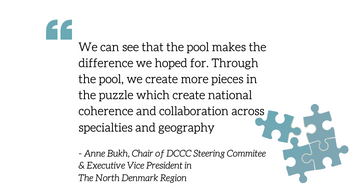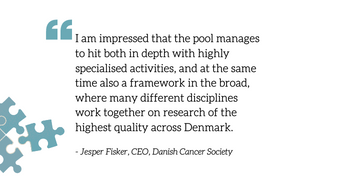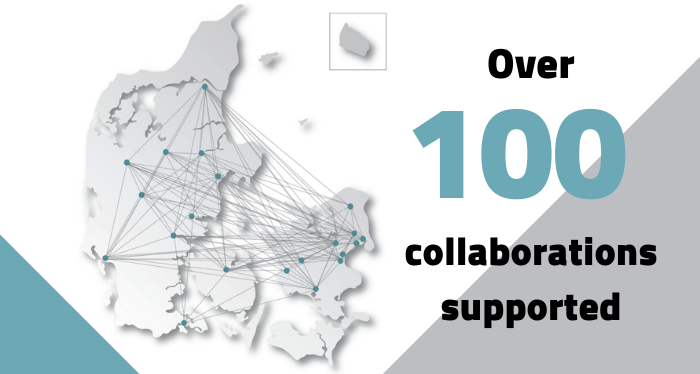In March 2022, the DCCC pool had supported over 100 activities that go across the country. Photo: DCCC
18-03-2022
Over one hundred times, the Danish Comprehensive Cancer Center, DCCC, has now supported activities that promote collaboration and knowledge sharing broadly in the field of cancer. This has resulted in over a hundred both large and small contributions to cross-disciplinary collaborations - and strengthened infrastructure for research across the country. DCCC's pool has reached a milestone.
"Here you can only get money if you cooperate broadly", was and is one of the crucial characteristics of DCCC's pool, explains Cai Grau, DCCC's first scientific chairman. In 2017, he helped set the framework for the pool's financial start-up aid for new collaborative initiatives in the field of cancer.
In March 2022, the pool rounded out over 100 supported activities. And a considerable effect on the Danish cancer landscape.
"When we started, it was a bit of a hurdle for our applicants that they should be at least three hospitals geographically distributed in the country, and not just their usual and well-known colleagues. That's not the case anymore. Now we receive applications spanning hospitals, GPs, universities, municipalities and other research partners from different disciplines ", says Cai Grau.
Broad, national and interdisciplinary collaboration in the field of cancer has grown and strengthened in Denmark, in recent years. The pool has been an important part of this, and that work is now also secured in the future.
At the same time as the milestone of 100 supported activities has been reached, the Danish Cancer Society has confirmed that they will continue to financially support the collaboration in the field of cancer through DCCC.
One hundred pieces for the puzzle
Up to DKK 200,000 per supported activity. That is the financial start-up aid that DCCC has distributed since 2017.
"We can see that the pool makes the difference we hoped for. Through the pool, we create more pieces in the puzzle which create national coherence and collaboration across specialties and geography. And thus, we strengthen the ultimate goal: to raise and uniform quality of treatment across processes and areas ", says Anne Bukh, chairman of DCCC's Steering Committee and Executive Vice President in The North Denmark Region.
About half of the pool's money comes from the Danish Cancer Society's support of DCCC's professional work, and that support has just been extended.
"It is great that the Danish Cancer Society continues to see the value in this part of our collaboration, so that in the coming years we also have the opportunity to distribute a significant bag of money," says Anne Bukh.
The same is said from Danish Cancer Society, where CEO Jesper Fisker confirms that the pool's money works on a broad scale:
"Many of our big goals for cancer patients are also DCCC's goals, and are strengthened through the work that DCCC does. Through the pool, DCCC has an enormously diverse reach. I am impressed that the pool manages to encompass both in-depth and highly specialised activities, and at the same time also a covers broad activities, where many different disciplines work together on research of the highest quality across Denmark. Therefore, we are really happy that we can continue to support the collaboration in DCCC also financially."
Each supported national network, the preparation of a clinical trial or other supported activity increases the cohesiveness of the cancer field in Denmark. New or improved methods are becoming more widespread and ineffective methods can be taken off the table, in favor of new research experiments that have potential.
This way, the pool provides pieces, and perhaps even glue, to the puzzle of both infrastructure and cooperation that lies behind a cancer course - that is at least the intention.
What is it good for?
DCCC was launched in 2017 to strengthen collaboration across specialties and disciplines - and at the same time ensure a broader and more systematic knowledge sharing in the field of cancer.
"The pool was a way to put DCCC's purpose on a formula that was straightforward for our area of influence," says Cai Grau, who at the time took on the chairmanship of the DCCC Scientific Commitee and has been the Chair until January 2022.
The pool is basically 'seed money' with a number of requirements that must be met. Unlike the large funds, the requirements are very specific and the application format reflects the size of the amount; it does not take months to apply for support.
And the applications are many. Although DKK 200,000 is not a large amount, it is enough for two years of activities in a network, or xan create the time that is absolutely necessary in the start-up of an interdisciplinary independent clinical study, which goes across many different geographical departments. 
"Collaborating broadly nationally, with more departments, specialties, professional groups and sectors, it's more uphill than doing your own study at your own hospital. The broad partnership requires more. But it is absolutely necessary, so therefore we offer support ", says Cai Grau.
A potent tool
In the early years, the pool hit the 'bulls eye'; both incentive and assistance were needed to form national, interdisciplinary networks. Many new networks launched and continue to run.
"We can conclude that the networks are successful when, several years after their grant is used, they are still active and submitting new applications for support for the preparation of clinical trials. Without our full planning, we could not have written a better script to strengthen the broad area of the cancer field, "says Cai Grau.
Cai Grau has left the chairmanship of DCCC's Scientific Committee to Henrik Frederiksen, but he is still the Deputy Chairman, and is looking forward with anticipation:
"The pool, as a tool, has been a big part of the fact that we have come a long way in strengthening the collaboration centered around cancer treatment at the hospital. In the future, we will do what we can to spread the good experiences throughout the patient's process, from early diagnosis to palliative care ", he says.
An increased focus on the rarer types of cancer and on all the possibilities and perspectives found in the basic research is also on the plate at DCCC, and thus also for the pool in the coming years.
"The pool is continuously visible and promotes our purpose. It's amazing that we can run it with the same financial strength that has been a success for the broad cancer field so far - now also well beyond the first hundred supported activities," concludes Cai Grau.

